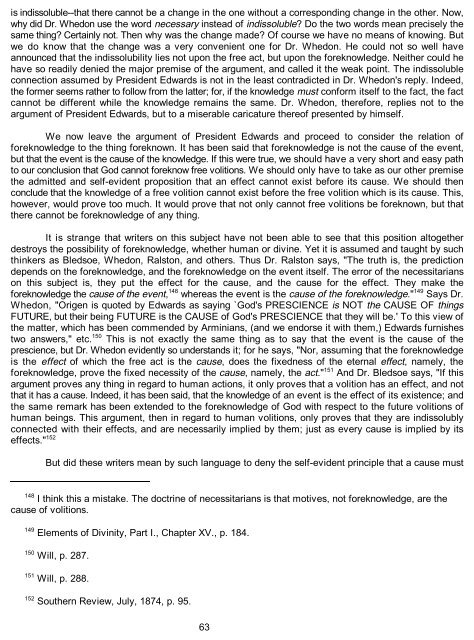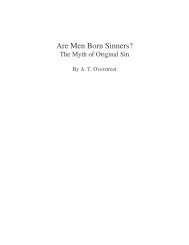Foreknowledge by Joel Hayes - Library of Theology
Foreknowledge by Joel Hayes - Library of Theology
Foreknowledge by Joel Hayes - Library of Theology
Create successful ePaper yourself
Turn your PDF publications into a flip-book with our unique Google optimized e-Paper software.
is indissoluble--that there cannot be a change in the one without a corresponding change in the other. Now,<br />
why did Dr. Whedon use the word necessary instead <strong>of</strong> indissoluble? Do the two words mean precisely the<br />
same thing? Certainly not. Then why was the change made? Of course we have no means <strong>of</strong> knowing. But<br />
we do know that the change was a very convenient one for Dr. Whedon. He could not so well have<br />
announced that the indissolubility lies not upon the free act, but upon the foreknowledge. Neither could he<br />
have so readily denied the major premise <strong>of</strong> the argument, and called it the weak point. The indissoluble<br />
connection assumed <strong>by</strong> President Edwards is not in the least contradicted in Dr. Whedon's reply. Indeed,<br />
the former seems rather to follow from the latter; for, if the knowledge must conform itself to the fact, the fact<br />
cannot be different while the knowledge remains the same. Dr. Whedon, therefore, replies not to the<br />
argument <strong>of</strong> President Edwards, but to a miserable caricature there<strong>of</strong> presented <strong>by</strong> himself.<br />
We now leave the argument <strong>of</strong> President Edwards and proceed to consider the relation <strong>of</strong><br />
foreknowledge to the thing foreknown. It has been said that foreknowledge is not the cause <strong>of</strong> the event,<br />
but that the event is the cause <strong>of</strong> the knowledge. If this were true, we should have a very short and easy path<br />
to our conclusion that God cannot foreknow free volitions. We should only have to take as our other premise<br />
the admitted and self-evident proposition that an effect cannot exist before its cause. We should then<br />
conclude that the knowledge <strong>of</strong> a free volition cannot exist before the free volition which is its cause. This,<br />
however, would prove too much. It would prove that not only cannot free volitions be foreknown, but that<br />
there cannot be foreknowledge <strong>of</strong> any thing.<br />
It is strange that writers on this subject have not been able to see that this position altogether<br />
destroys the possibility <strong>of</strong> foreknowledge, whether human or divine. Yet it is assumed and taught <strong>by</strong> such<br />
thinkers as Bledsoe, Whedon, Ralston, and others. Thus Dr. Ralston says, "The truth is, the prediction<br />
depends on the foreknowledge, and the foreknowledge on the event itself. The error <strong>of</strong> the necessitarians<br />
on this subject is, they put the effect for the cause, and the cause for the effect. They make the<br />
148 149<br />
foreknowledge the cause <strong>of</strong> the event, whereas the event is the cause <strong>of</strong> the foreknowledge." Says Dr.<br />
Whedon, "Origen is quoted <strong>by</strong> Edwards as saying `God's PRESCIENCE is NOT the CAUSE OF things<br />
FUTURE, but their being FUTURE is the CAUSE <strong>of</strong> God's PRESCIENCE that they will be.' To this view <strong>of</strong><br />
the matter, which has been commended <strong>by</strong> Arminians, (and we endorse it with them,) Edwards furnishes<br />
150<br />
two answers," etc. This is not exactly the same thing as to say that the event is the cause <strong>of</strong> the<br />
prescience, but Dr. Whedon evidently so understands it; for he says, "Nor, assuming that the foreknowledge<br />
is the effect <strong>of</strong> which the free act is the cause, does the fixedness <strong>of</strong> the eternal effect, namely, the<br />
151<br />
foreknowledge, prove the fixed necessity <strong>of</strong> the cause, namely, the act." And Dr. Bledsoe says, "If this<br />
argument proves any thing in regard to human actions, it only proves that a volition has an effect, and not<br />
that it has a cause. Indeed, it has been said, that the knowledge <strong>of</strong> an event is the effect <strong>of</strong> its existence; and<br />
the same remark has been extended to the foreknowledge <strong>of</strong> God with respect to the future volitions <strong>of</strong><br />
human beings. This argument, then in regard to human volitions, only proves that they are indissolubly<br />
connected with their effects, and are necessarily implied <strong>by</strong> them; just as every cause is implied <strong>by</strong> its<br />
effects." 152<br />
148<br />
I think this a mistake. The doctrine <strong>of</strong> necessitarians is that motives, not foreknowledge, are the<br />
cause <strong>of</strong> volitions.<br />
149<br />
150<br />
151<br />
152<br />
But did these writers mean <strong>by</strong> such language to deny the self-evident principle that a cause must<br />
Elements <strong>of</strong> Divinity, Part I., Chapter XV., p. 184.<br />
Will, p. 287.<br />
Will, p. 288.<br />
Southern Review, July, 1874, p. 95.<br />
63






